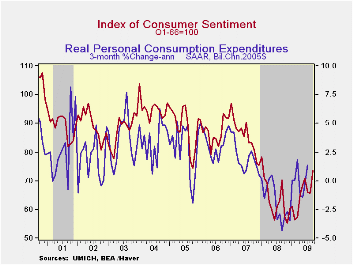 Global| Sep 25 2009
Global| Sep 25 2009Michigan Consumer Sentiment Improves To Highest Since Early 2008
by:Tom Moeller
|in:Economy in Brief
Summary
Consumer sentiment may be showing the effects of the lessened declines recently logged by overall employment. The University of Michigan's September reading of consumer sentiment rose to 73.5 from the mid-month reading of 70.2 and it [...]
 Consumer
sentiment may be showing the effects of the lessened declines recently
logged by overall employment. The University of Michigan's September
reading of consumer sentiment rose to 73.5 from the mid-month reading
of 70.2 and it was up by nearly one-third from the low last Fall.
Consensus expectations had been for a September reading of 70.5. During
the last ten years, there has been a 69% correlation between the level
of sentiment and the growth in real consumer spending during the next
five months.
Consumer
sentiment may be showing the effects of the lessened declines recently
logged by overall employment. The University of Michigan's September
reading of consumer sentiment rose to 73.5 from the mid-month reading
of 70.2 and it was up by nearly one-third from the low last Fall.
Consensus expectations had been for a September reading of 70.5. During
the last ten years, there has been a 69% correlation between the level
of sentiment and the growth in real consumer spending during the next
five months.
The expectations component of the sentiment index rose
the most this month with a 13.1% gain after a 2.8% August rise.
Expected business conditions during the next year jumped 27.5% (35.4%
y/y) to their highest in two years and expectations for conditions
during the next five years rose 13.7% (9.6% y/y).  Expectations for
personal finances rose a lesser 3.6% and remained down from last year.
Inflation expectations for the next year fell sharply to 2.8% which was
the lowest level since March. That compares to a low of 1.7% last
December but remained down from a reading which was as high as 7.0%
during May of last year.
Expectations for
personal finances rose a lesser 3.6% and remained down from last year.
Inflation expectations for the next year fell sharply to 2.8% which was
the lowest level since March. That compares to a low of 1.7% last
December but remained down from a reading which was as high as 7.0%
during May of last year.
The reading of current economic conditions made up the declines during the prior two months with a 10.2% increase. The reading of current personal finances made up all of the August decline with a 19.0% increase but that left it sharply below the year ago level as employment & income remained down. In fact, the reading remained near the record low. Also within the current conditions index was an increase in perceived buying conditions for large household goods that made up declines during the prior two months. (+12.1% y/y).
 The opinion of government policy,
which may eventually influence economic expectations, made up the
August decline but remained near the lowest level since
February. Thirty one percent of respondents thought that a poor job was
being done by government while 23% thought that a good job was being
done.
The opinion of government policy,
which may eventually influence economic expectations, made up the
August decline but remained near the lowest level since
February. Thirty one percent of respondents thought that a poor job was
being done by government while 23% thought that a good job was being
done.
The University of Michigan survey data is not seasonally adjusted. The reading is based on telephone interviews with about 500 households at month-end; the mid-month results are based on about 300 interviews. The summary indexes are in Haver's USECON database with details in the proprietary UMSCA database.
| University of Michigan | September | Mid-September | August | Sept y/y | 2008 | 2007 | 2006 |
|---|---|---|---|---|---|---|---|
| Consumer Sentiment | 73.5 | 70.2 | 65.7 | 4.6% | 63.8 | 85.6 | 87.3 |
| Current Conditions | 73.4 | 71.8 | 66.6 | -2.1 | 73.7 | 101.2 | 105.1 |
| Expectations | 73.5 | 69.2 | 65.0 | 9.4 | 57.3 | 75.6 | 75.9 |
Tom Moeller
AuthorMore in Author Profile »Prior to joining Haver Analytics in 2000, Mr. Moeller worked as the Economist at Chancellor Capital Management from 1985 to 1999. There, he developed comprehensive economic forecasts and interpreted economic data for equity and fixed income portfolio managers. Also at Chancellor, Mr. Moeller worked as an equity analyst and was responsible for researching and rating companies in the economically sensitive automobile and housing industries for investment in Chancellor’s equity portfolio. Prior to joining Chancellor, Mr. Moeller was an Economist at Citibank from 1979 to 1984. He also analyzed pricing behavior in the metals industry for the Council on Wage and Price Stability in Washington, D.C. In 1999, Mr. Moeller received the award for most accurate forecast from the Forecasters' Club of New York. From 1990 to 1992 he was President of the New York Association for Business Economists. Mr. Moeller earned an M.B.A. in Finance from Fordham University, where he graduated in 1987. He holds a Bachelor of Arts in Economics from George Washington University.
More Economy in Brief
 Global| Feb 05 2026
Global| Feb 05 2026Charts of the Week: Balanced Policy, Resilient Data and AI Narratives
by:Andrew Cates






